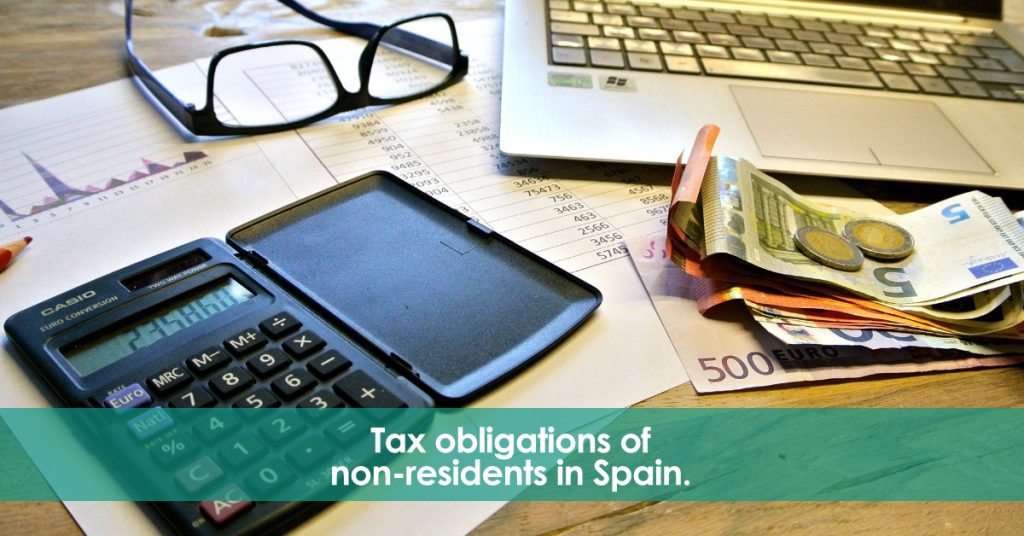Many owners of a property in Spain believe that, since they are non-tax residents in Spain, they have hardly any tax obligations in our country. Nothing could be further from the truth. In this week’s article we review the main tax obligations of Non-Residents in Spain. And how failure to meet these obligations can affect them in the future if they decide to sell their home.
Property Tax and Rubbish Collection Tax.
Most non-residents who own a property in Spain will probably be familiar with the IBI (Property Tax) and the Rubbish Collection Tax. The IBI is an annual tax levied on the ownership of urban or rural real estate in Spain, that varies depending on the cadastral value of the property. The Rubbish Collection Tax is paid both for the collection and cleaning of rubbish containers. It is paid quarterly, half-yearly or even annually, depending on the area.
Wealth tax in Spain.
This tax is levied on the net wealth of individuals, although the first €700,000 is exempt from payment. For the purposes of its calculation, only assets located in Spanish territory are taken into account.
Non-Resident Income Tax (tax form 210).
As we explained in previous articles, non-residents who own a property in Spain must pay Non-Resident Income Tax (IRNR). This tax is levied on the rental, simple ownership or sale of a property in Spain.
Renting.
If you rent your property, you must declare the income received on a quarterly basis, in the first twenty calendar days of April, July, October and January. Citizens from the EU, Iceland or Norway are taxed at 19% (and can deduct community charges, repairs, IBI, etc.). The rest are taxed at 24% and cannot deduct any expenses. In other words, for a rent of 8,400€ per year, a British citizen will pay 2,016€ in taxes, while a French citizen will pay 1,596€ (less, if he/she deducts certain expenses).
Simple tenancy.
If the property is not rented and is for your own use, you must file tax form 210 annually (always in the calendar year following the accrual year). The amount payable is calculated by multiplying 1.1% or 2% of the cadastral value of the property by a tax rate that varies depending on whether the owner is resident in the EU, Iceland or Norway (19%) or not (24%).
Sale of a property.
When a non-resident sells his or her property in Spain, any capital gains obtained are taxed at a rate of 19%. There is no discrimination between EU and non-EU nationals. Both will be able to deduct notary, registration, property, real estate, lawyer, etc. fees.
The 3% retention in the event of the sale of a property.
Whether or not there is a capital gain, when a non-resident sells his/her property in Spain, the buyer is forced by law to withhold 3% of the sale price. In other words, if you sell your property for €300,000, the buyer will retain €9,000, and pay it to the Tax Agency, as an advancement on your possible capital gain as vendor. The deadline for declaring the existence (or not) of a capital gain is 4 months from the signing of the public deed.
If there is no capital gain (i.e. if you have sold for less than what it cost you) you can request a refund of this retention. However, if during the time you were owner, you did not declare annually or quarterly (depending on the case) the Non-Resident Income Tax, you should know that the Tax Agency could force you to catch up with the last four years of this tax.
Conclusions.
At White-Baos Lawyers we are specialists in providing legal advice to expatriates for more than 15 years. If you own a property but are not a tax resident in Spain, do not hesitate to contact us. We will offer you expert advice on the tax obligations of non-residents in Spain.
The information provided in this article is not intended to be legal advice, but merely conveys information related to legal issues.
Carlos Baos (Lawyer)
White & Baos.
Tel: +34 966 426 185
E-mail: info@white-baos.com
White & Baos 2023 – All Rights Reserved.
